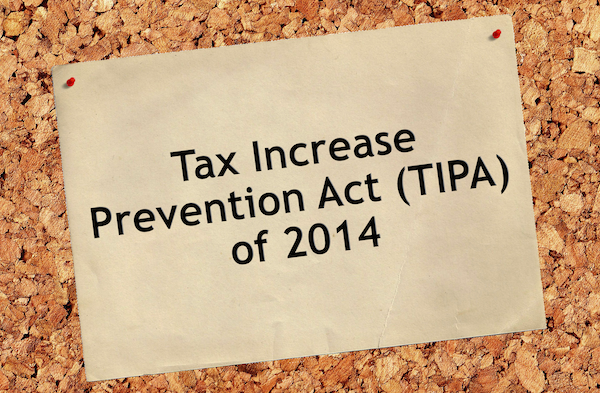Tax planning is not usually on our minds during the holiday season. However, with the delayed passing of a tax bill by Congress, we thought it was important to give you this information so you know how it will affect you for 2015.
On December 19, 2014, the President signed into law the Tax Increase Prevention Act of 2014 (TIPA) which extends many of the tax provisions that expired on December 31, 2013. Most of the tax breaks that expired at the end of 2013 have been revived and extended in TIPA for tax year 2014. TIPA generally renews the tax breaks for one year through the end of 2014, allowing businesses and individuals to claim them on their 2014 tax returns. A number of the extended tax provisions that may affect you include:
.png.aspx)
- Internal Revenue Code Section 168(k) allows an additional first-year depreciation deduction equal to 50% of the adjusted basis of original use property (new property, not used property) acquired and placed in service between January 1, 2012 and December 31, 2013. The basis of the property and the depreciation allowances in the year of purchase and later years are adjusted to reflect the additional first-year depreciation deduction. A taxpayer may elect out of additional first-year depreciation for any class of property. Under the previous law, the bonus depreciation provisions didn't apply to property placed in service after December 31, 2013. TIPA extends 50% first-year bonus depreciation for one year so that it applies to qualified property acquired and placed in service before January 1, 2015.
- Under Internal Revenue Code Section 179 (§179), a taxpayer may elect to deduct as an expense, rather than to depreciate, up to a specified amount of the cost of new or used equipment placed in service during the tax year in the taxpayer's trade or business. The maximum annual expensing amount generally is reduced dollar-for-dollar by the amount of eligible §179 property placed in service during the tax year in excess of a specified investment ceiling. Amounts ineligible for expensing due to excess investments in eligible property can't be carried forward and expensed in a subsequent year. Rather, they can only be recovered through depreciation. The amount eligible to be expensed for a tax year can't exceed the taxable income derived from the taxpayer's active conduct of a trade or business. Any amount that is not allowed as a deduction because of the taxable income limitation may be carried forward to succeeding tax years. For tax years beginning in 2013, the dollar limitation on the expensing deduction was $500,000 and the reduction in the dollar limitation began to take effect when property placed in service in the tax year exceeds $2,000,000 (the investment ceiling). Under the previous law, effective for tax year beginning in 2014, the maximum expensing limit dropped to $25,000, and the investment ceiling dropped to $200,000. TIPA retroactively extends for one year the increased $500,000 maximum expensing amount under §179 and the increased $2 million investment-based phase-out amount. As a result, these increased amounts will continue to apply for qualified property placed in service in tax years beginning after December 31, 2013 and before January 1, 2015.
- Discharge of indebtedness income from qualified principal residence mortgage debt, up to a $2 million limit ($1 million for married individuals filing separately), is excluded from gross income. Under the previous law, the exclusion of discharge of indebtedness income on a principal residence did not apply to any debt discharged after December 31, 2013. Under TIPA, the exclusion of discharge of indebtedness income on a principal residence applies to any principal residence home mortgage debt discharged before January 1, 2015.
- Mortgage insurance premiums paid or accrued by a taxpayer in connection with a home mortgage with respect to the taxpayer's qualified residence are treated as deductible mortgage interest, subject to a phase-out amount based on the taxpayer's adjusted gross income (AGI). Under the previous law, this provision only applied to mortgage insurance premiums paid or accrued before January 1, 2014. Under TIPA, the deductibility of mortgage insurance premiums, as qualified mortgage interest, is extended until January 1, 2015.
- Taxpayers, who itemize deductions on Schedule A, may elect to deduct state and local general sales and use taxes instead of state and local income taxes. Under the previous law, the deduction of state and local sales and use taxes were only deductible through December 31, 2013. Under TIPA, the state and local sales and use tax deduction is retroactively extended through December 31, 2014.
- Eligible individuals can deduct qualified tuition and related expenses of the taxpayer, spouse, or dependents, as a deduction to gross income to arrive at AGI. The maximum deduction is $4,000 for an individual whose AGI for the tax year doesn't exceed $65,000 ($130,000 in the case of a joint return), or $2,000 for other individuals whose adjusted gross income doesn't exceed $80,000 ($160,000 in the case of a joint return). No deduction is allowed for an individual whose AGI exceeds the AGI limitations, for a married individual who does not file a joint return, or for an individual for whom a personal exemption deduction may be claimed by another taxpayer for the tax year. Under the previous law, this deduction was not available after December 31, 2013. Under TIPA, this deduction has been extended through December 31, 2014.
If you have any questions about any of this make sure you contact an ATBS business consultant at (888) 640-4829, or by email info@atbsshow.com.